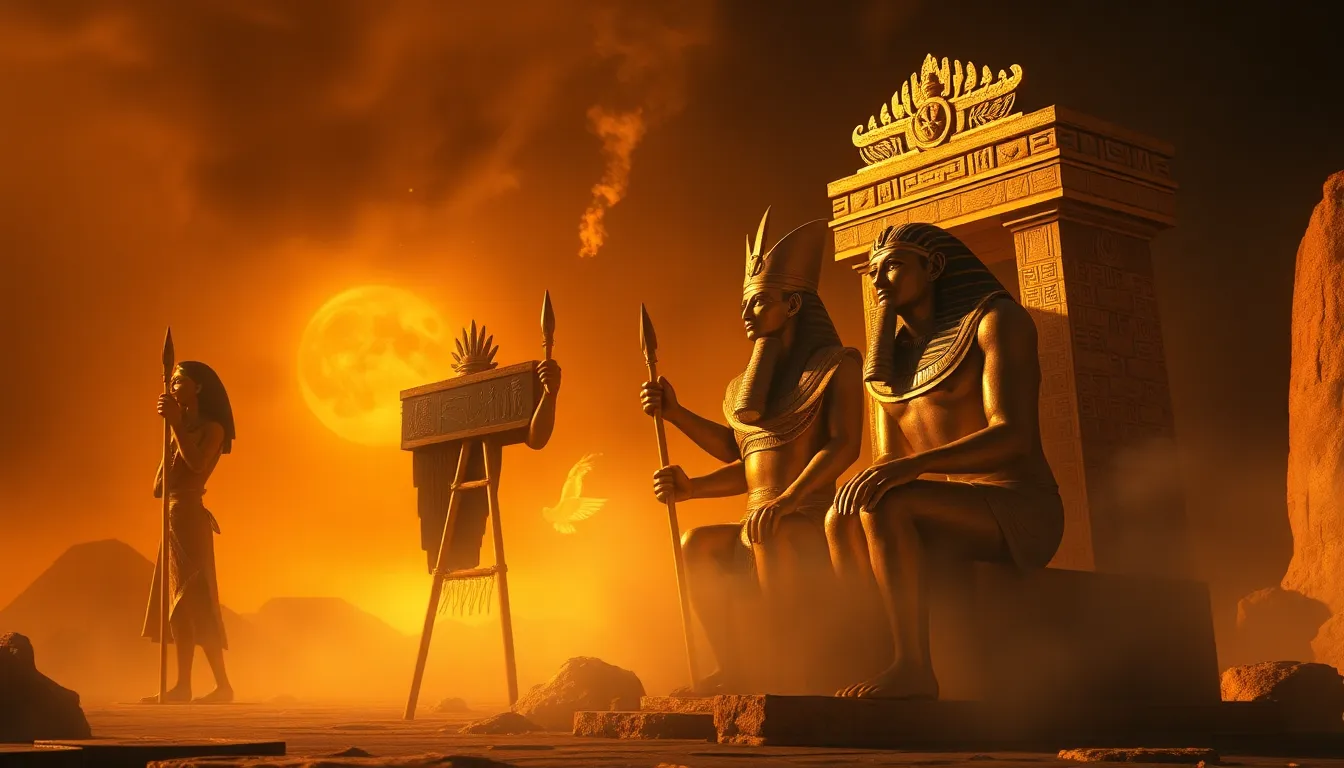The Role of the Gods in Egyptian Creation Rituals
I. Introduction
Egyptian mythology is a rich tapestry of stories and beliefs that explain the origins of the world and the role of the divine. Creation myths are central to understanding the ancient Egyptians’ worldview, reflecting their values, beliefs, and cultural identity. The gods hold a significant place in these myths, serving as both creators and maintainers of the universe. This article explores the role of the gods in Egyptian creation rituals, highlighting how these deities shaped not only the cosmos but also the everyday lives of the people.
II. The Cosmic Setting of Egyptian Creation
Before any creation took place, there existed a state of chaos known as Nun. This primordial void was characterized by darkness and emptiness, a concept that held great significance in Egyptian thought. From this chaos emerged the first gods, who brought order to the universe.
The emergence of order from chaos is a recurring theme in Egyptian creation myths. The gods worked collaboratively to establish the world, separating land from water and creating the heavens and the earth. This process symbolized not only the creation of the physical world but also the establishment of cosmic and social order.
III. Major Deities Involved in Creation
Several key deities play pivotal roles in the Egyptian creation myths:
- Atum: The Self-Creator – Atum is often regarded as the first god, emerging from the chaos of Nun. He created himself and subsequently gave birth to other gods, symbolizing the beginning of all existence.
- Ra: The Sun God – Ra is one of the most important deities in Egyptian mythology. As the sun god, he represents light, life, and creation. His daily voyage across the sky is seen as a cycle of regeneration and renewal.
- Ptah: The God of Craftsmen – Ptah is associated with creation through craftsmanship. He is believed to have created the world through his thoughts and words, emphasizing the power of language and artistic skill in the act of creation.
IV. Creation Myths and Their Variations
Egyptian creation myths are diverse, with different regions celebrating distinct versions:
A. The Heliopolitan Creation Myth
Originating in Heliopolis, this myth centers on Atum, who creates the first gods by spitting them out or by masturbating. This myth emphasizes the importance of the sun and light in the process of creation.
B. The Memphite Creation Myth
The Memphite version focuses on Ptah as the creator who shapes the world through his heart and speech. It highlights the significance of craftsmanship and the divine act of creation through thought.
C. The Theban Creation Myth
This myth presents Amun as the hidden god who creates the universe. Amun’s role reflects the importance of the unseen and the mysterious aspects of creation.
V. Rituals Associated with Creation
Rituals played a crucial role in the religious life of ancient Egyptians, especially those dedicated to creation. These rituals served to honor the gods and reinforce the cosmic order they established.
A. Significance of rituals in Egyptian society
Rituals were vital for maintaining harmony between the divine and the mortal realms. They were performed to ensure the favor of the gods and to celebrate the ongoing process of creation.
B. Specific rituals dedicated to creation deities
- Creation festivals honoring Atum, where rituals symbolized the renewal of the world.
- Rituals for Ra that involved the rising sun, signifying rebirth and the cyclical nature of life.
- Crafting ceremonies dedicated to Ptah, emphasizing the importance of skilled workmanship in creation.
C. Symbolism in creation rituals
Creation rituals were steeped in symbolism, often involving elements like water, light, and sacred objects that represented the universe’s order. These symbols served to connect the participants with the divine act of creation.
VI. The Relationship Between Gods and Humanity
The relationship between the gods and humans in Egyptian mythology is one of mutual dependence. The gods are seen as both creators and maintainers of order, while humans have responsibilities towards these deities.
A. The role of gods as creators and maintainers of order
The gods established Ma’at, the principle of truth and order, which humans were expected to uphold in their daily lives. This cosmic order was essential for the well-being of society.
B. Human responsibilities towards the gods
Humans were tasked with performing rituals, offering prayers, and making sacrifices to appease the gods. This reciprocity was believed to ensure divine favor and protection.
C. The concept of divine favor and its implications
Divine favor was crucial for success in life, from agriculture to politics. The Egyptians believed that maintaining a good relationship with the gods could lead to prosperity and stability.
VII. Influence of Creation Myths on Egyptian Culture
The creation myths and their associated deities had a profound impact on various aspects of Egyptian culture:
A. Creation myths in art and literature
Mythological themes were prevalent in Egyptian art and literature, depicting scenes of creation and the gods’ interactions with humanity. These artistic expressions reinforced the cultural significance of these myths.
B. Impact on architecture and temple design
Temples were constructed as sacred spaces for the worship of creation deities. Their designs often reflected the themes of creation and order, with specific areas dedicated to different gods.
C. The legacy of creation beliefs in later Egyptian history
Even as dynasties changed, the core beliefs surrounding creation remained influential. These myths shaped the identity of the Egyptian civilization throughout its long history.
VIII. Conclusion
In summary, the role of the gods in Egyptian creation rituals is a testament to the profound relationship between the divine and the mortal. Through their stories and rituals, the ancient Egyptians sought to understand their existence and the world around them.
The enduring significance of these creation myths highlights their importance in shaping not only religious practices but also the cultural identity of Egypt. The legacy of these beliefs continues to fascinate and inform our understanding of ancient civilizations and their complex relationship with mythology.




